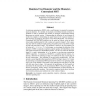Free Online Productivity Tools
i2Speak
i2Symbol
i2OCR
iTex2Img
iWeb2Print
iWeb2Shot
i2Type
iPdf2Split
iPdf2Merge
i2Bopomofo
i2Arabic
i2Style
i2Image
i2PDF
iLatex2Rtf
Sci2ools
131
click to vote
IJCM
2002
2002
Random-tree Diameter and the Diameter-constrained MST
A minimum spanning tree (MST) with a small diameter is required in numerous practical situations. It is needed, for example, in distributed mutual exclusion algorithms in order to minimize the number of messages communicated among processors per critical section. Understanding the behavior of tree diameter is useful, for example, in determining an upper bound on the expected number of links between two arbitrary documents on the World Wide Web. The DiameterConstrained MST (DCMST) problem can be stated as follows: given an undirected, edge-weighted graph G with n nodes and a positive integer k, find a spanning tree with the smallest weight among all spanning trees of G which contain no path with more than k edges. This problem is known to be NP-complete, for all values of k; 4 k n - 2). In this paper, we investigate the behavior of the diameter of MST in randomly-weighted complete graphs (in Erd
Algorithm | IJCM 2002 | Spanning Tree | Tree |
| Added | 19 Dec 2010 |
| Updated | 19 Dec 2010 |
| Type | Journal |
| Year | 2002 |
| Where | IJCM |
| Authors | Ayman Abdalla, Narsingh Deo |
Comments (0)

